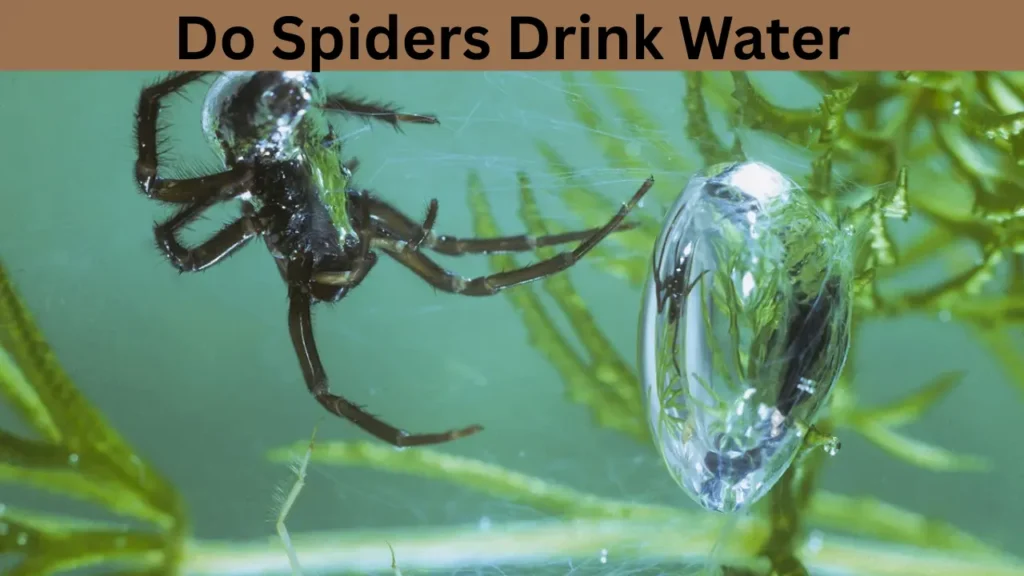Spiders are fascinating creatures, and many people wonder, do spiders drink water? These tiny arachnids, despite their scary reputation, have basic needs just like any other living being. Understanding how they hydrate can give us better insight into their survival habits, especially in both wild and home environments.
Also Read: cenpok.com
Understanding Spider Biology: Why Water Matters
To answer the question, do spiders drink water, we must first look at their biology. Spiders have a very simple body structure compared to mammals. They rely heavily on their environment for sustenance, including moisture. Although they primarily gain hydration from their prey, many species of spiders actively seek water sources when needed.
Spiders, especially those living indoors, sometimes need extra moisture. In homes, they may find water in sinks, bathtubs, or small puddles. Their tiny bodies cannot store a lot of water, so regular access to moisture is important for their survival.
Also Read: Doctorhub360.com Neurological Diseases: Symptoms, Treatment
Natural Ways Spiders Get Water
Nature provides various ways for spiders to stay hydrated. But do spiders drink water directly in the wild? The answer is yes. Spiders often rely on natural sources like dew drops, rainwater, and moisture from leaves. Some species even position themselves strategically to capture raindrops or condensation.
Spiders that build webs may sometimes find water collected on the strands of their silk. They can easily drink these tiny water droplets. Ground-dwelling spiders, on the other hand, may search for water on soil surfaces, under rocks, or inside tree bark crevices.
Also Read: Destin Water Temperature: A Complete Guide for Visitors
How Spiders Drink Water
Do spiders drink water the same way other animals do? Not exactly. They do not have a mouth like mammals. Instead, spiders use a tiny mouthpart called a chelicerae to suck liquids. When they find a water source, they gently touch it with their mouthparts and draw in the moisture.
The process is slow and delicate. Since spiders are small, they cannot drink large amounts at once. They often drink just enough to rehydrate, especially after feeding on dry prey or during hot weather.
Also Read: AO Smith Water Heater Age: Check, Maintain, Replace
How Much Water Do Spiders Need?
If you are asking do spiders drink water and how much they need, the answer depends on the species, size, and environment. Larger spiders like tarantulas may need more frequent access to water. Tiny spiders, like cobweb spiders or jumping spiders, require only minute amounts of moisture.
In extremely dry areas, spiders adapt by conserving water internally. They reduce their activity during the hottest parts of the day and become more active at night when moisture is higher in the air.
Also Read: https://techzoneelectronics.com Finance: Smart Payment
Here’s a simple table showing different spider types and their hydration habits:
| Spider Type | Hydration Source | Frequency |
|---|---|---|
| House Spiders | Sink, bathroom moisture | Weekly |
| Tarantulas | Water bowls, prey moisture | Every 2–3 days |
| Jumping Spiders | Dew drops, prey fluids | Every few days |
| Wolf Spiders | Groundwater, rain puddles | Weekly |
| Orb-Weaver Spiders | Rainwater collected on webs | After rainfall |
Do Spiders Need Water Indoors?
When thinking about do spiders drink water inside homes, it is important to note that indoor spiders often find water easily. Leaky faucets, damp basements, condensation on windows, and even pet water bowls can provide enough hydration.
Sometimes, homeowners unknowingly create a perfect environment for spiders to thrive by leaving water sources open. Sealing leaks and drying out damp areas can reduce spider populations indoors without needing chemical sprays.
How Spiders Survive Without Water for Days
An interesting aspect when discussing do spiders drink water is their ability to survive without it for extended periods. Spiders have evolved to be resilient. In times of drought or when no water is available, they slow down their metabolism. This helps them conserve internal fluids.
Spiders can absorb small amounts of moisture through their food. Insects and other prey are often filled with body fluids, which help the spider stay hydrated. This ability to derive water from their meals is critical for survival in dry conditions.
Spiders in the Desert: How They Stay Hydrated
If you wonder do spiders drink water in the desert, the answer is still yes, but with some clever adaptations. Desert spiders have special behaviors to maximize hydration:
- They are nocturnal, avoiding the dry heat of the day.
- They seek shade under rocks and burrow underground.
- They feed on juicy prey that has high moisture content.
These spiders have adapted to survive with minimal direct drinking. They depend almost entirely on prey moisture and the slight humidity present at night.
Do Pet Spiders Need Water?
For those who keep pet spiders, it’s essential to consider do spiders drink water and provide them with a proper hydration source. Pet tarantulas, for example, require a shallow water dish. This dish should be cleaned regularly to prevent mold or bacteria growth.
Even though tarantulas can get some hydration from their food, direct access to water ensures their health and longevity. Proper humidity levels also help in keeping the spider’s exoskeleton healthy and prevent dehydration.
Common Myths About Spider Hydration
Many myths surround spider hydration. Some people believe spiders never drink water because they only eat prey. However, the truth about do spiders drink water is clear: they do drink whenever necessary.
Another myth suggests that spiders can survive forever without water. In reality, while they can endure dry spells, prolonged dehydration can kill them. Just like any living organism, water is vital for their biological functions.
Spider Water Consumption in Different Seasons
Seasons also affect how often spiders need water. During hot summers, the need for hydration increases. Do spiders drink water more in summer? Yes, because heat causes more water loss through their exoskeleton.
In winter, spiders enter a form of dormancy known as diapause. They slow down their bodily functions and need less water. However, if they stay active indoors during winter, they will still seek small amounts of moisture to survive.
Here’s a quick table showing seasonal behavior:
| Season | Water Needs | Behavior |
|---|---|---|
| Summer | High | Active, seeking moisture |
| Winter | Low | Dormant or semi-active indoors |
| Spring | Moderate | Active due to breeding season |
| Autumn | Moderate | Preparing for winter slow-down |
Water Sources for Different Spider Species
When asking do spiders drink water, it is important to remember that not all spider species behave the same. For example, trapdoor spiders live underground where moisture is trapped in the soil. They get water from the dampness of their burrows and the fluids of captured prey.
Web-building spiders, like garden spiders and orb-weavers, are often seen drinking water droplets caught on their webs after rain. In fact, web silk itself can sometimes attract dew, providing a steady source of hydration.
Hunting spiders such as wolf spiders do not spin webs. They rely on rain puddles or morning dew on plants to stay hydrated. They also consume insects rich in fluids to meet their water needs.
Final Thoughts
So, do spiders drink water? Yes, they absolutely do. Whether through natural droplets, drinking from puddles, or absorbing moisture from their prey, spiders have adapted to meet their hydration needs creatively.
Understanding how spiders drink water helps us appreciate these creatures even more. Despite their small size and creepy reputation, spiders are remarkable survivors. Their ability to find and use water resources reflects the amazing diversity and resilience of life on Earth.
If you ever spot a spider near a sink or bathtub, now you know it is simply trying to survive. Offering respect to their needs not only helps the environment but also teaches us valuable lessons about adaptation and survival.



